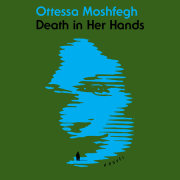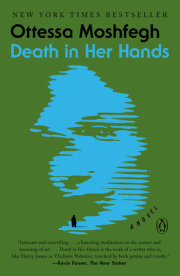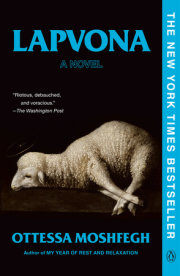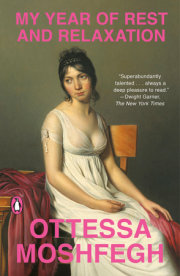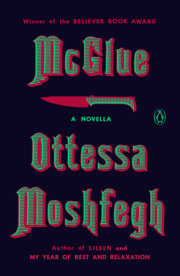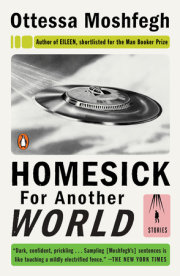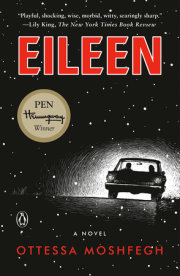One
Her name was Magda. Nobody will ever know who killed her. It wasn't me. Here is her dead body.But there was no body. No bloodstain. No tangle of hair caught on the coarse fallen branches, no red wool scarf damp with morning dew festooned across the bushes. There was just the note on the ground, rustling at my feet in the soft May wind. I happened upon it on my dawn walk through the birch woods with my dog, Charlie.
I'd discovered the path the previous spring just after Charlie and I had moved to Levant. We'd worn it down all spring, summer, and fall, but abandoned it during winter. The slim white trees had been nearly invisible against the snow. On foggy mornings, the birches completely disappeared in the mist. Since the thaw, Charlie had been waking me up every morning at daybreak. We'd cross the dirt road and trudge up the slow rise and fall of a little hill, and weave our way back and forth through the birches. That morning, when I found the note laid flat on the path, we'd made it about a mile into the woods.
Charlie did not slow or tilt his head or even lower his nose to the ground to sniff. It seemed very odd to me that he'd just ignore it-my Charlie, who once broke off his leash and ran off across the freeway to fetch a dead bird, so strong was his instinct to ferret out the dead. No, he didn't give the note a second glance. Little black rocks pinned the note down to the ground, each placed carefully on the page in the top margin and along the bottom. I bent down to read it again. Under my hands, the earth was almost warm, shy pale grass poking up here and there in the crumbly black dirt, the sun just starting to brighten in hue from silver to yellow.
Her name was Magda.It was a joke, I thought, a prank, a ruse. Somebody was playing games. That was my initial impression. Isn't it sweet to look back at how my mind jumped to the most innocuous conclusion? That after so many years, at seventy-two, my imagination was still so naive? Experience should have taught me that first impressions are often misleading. Kneeling down in the dirt, I considered the details: the paper was a page from a lined, spiral notebook, its perforated edge broken cleanly, no straggly bits from where it had been torn out; careful, small printed letters in blue ballpoint pen. It was hard to decipher much from the penmanship, and that seemed deliberate. It was the kind of neat, impersonal printing you'd use when making a sign for a yard sale, or filling out a form at the dentist. Wise, I thought. Smart. Whoever had written the note understood that by masking one's peculiarities, one invokes authority. There is nothing as imposing as anonymity. But the words themselves, when I spoke them aloud, seemed witty, a rare quality in Levant, where most people were blue collar and dull. I read the note again and almost chuckled over that penultimate line,
It wasn't me. Of course it wasn't.
If not a prank, the note could have been the beginning of a story tossed out as a false start, a bad opening. I could understand the hesitation. It's a rather dark, damning way to begin a story: the pronouncement of a mystery whose investigation is futile.
Nobody will ever know who killed her. The story is over just as it's begun. Was futility a subject worthy of exploration? The note certainly didn't promise any happy ending.
Here is her dead body. Surely there was more to say. Where was Magda? Was it so hard to come up with a description of her corpse, tangled in the brush under a fallen tree, her face half sunken into the soft black dirt, her hands hog-tied behind her back, the blood from her stab wounds leaching into the ground? How hard was it to imagine a small golden locket glinting between sodden birch leaves, the chain broken and dashed through the new, tender, hairy grass? The locket could contain photos of a young, gap-toothed child on one side-Magda at age five-and a man in a military hat on the other, her father, I'd guess. Or maybe "hog-tied" would be a bit too strong. Maybe "stab wounds" were too graphic too soon. Perhaps the killer simply positioned her arms behind her back so they wouldn't stick out from under the rotting branches and catch somebody's eye. The pale skin of Magda's hands would stand out against the dark ground, like the white paper on the path, I imagined. It seemed better to begin with gentler descriptions. I could write the book myself if I had the discipline, if I thought anyone might read it.
As I stood, my thoughts were bleached and stunted by a terrible pain in my head and eyes, which often happened when I got up too quickly. I always had poor circulation, low blood pressure, "a weak heart," my husband had called it. Or perhaps I was hungry. I have to be careful, I told myself. One day I might faint in the wrong place and hit my head, or cause an accident in my car. That would be the end of me. I had no one to tend to me if I fell ill. I'd die in some cheap country hospital and Charlie would get slaughtered at the pound.
Charlie, as though he could sense my dizziness, came to my side and licked my hand. In doing so, he stepped on the note. I heard the paper crinkle. Pity to have that pristine page now sullied with a paw print. But I didn't chide him. I scratched his silky head with my fingers.
Maybe I was being too imaginative, I thought, scanning the note again. I could picture a high school boy wandering the woods, thinking up some funny gore, writing these first few lines, then losing steam, discarding the story for one he found easier to conjure up: the tale of a lost sock, a fight on the football field, a man going fishing, kissing a girl behind the garage. What did some Levant teen need with Magda and her mystery? Magda. This was not a Jenny or Sally or Mary or Sue. Magda was a name for a character with substance, a mysterious past. Exotic, even. And who would want to read about that here, in Levant? The only books at Goodwill were about knitting and World War II.
"Magda. She's strange," they'd say.
"I wouldn't want Jenny or Sally to be hanging around a girl like Magda. Who knows what kind of values she was raised with?"
"Magda. What kind of name is that? An immigrant? Some different language?"
No wonder he had given up on Magda so quickly. Her situation was too complex, too nuanced for a young kid to understand. It would take a wise mind to do Magda's story real justice. Death was hard to look at, after all. "Skip it," I can imagine the boy saying, discarding these first few lines. And with that, Magda and all her potential were abandoned. However, there were no signs of neglect, or frustration, nothing revised or rewritten. On the contrary, the lines were pristine and even. Nothing was scribbled out. The paper hadn't been crumpled up or even folded. And those little rocks . . .
"Magda?" I said aloud, not knowing exactly why. Charlie seemed not to care. He busied himself chasing drifting dandelion puffs through the trees. I paced up and down the path for a few minutes, scrutinized the dirt for anything that seemed out of place, then walked around the surrounding area in a narrowing gyre. I was hoping to find another note, another clue. I whistled to Charlie every time he strayed too far. There weren't any strange new paths through the trees that I could see, but then, of course, my own shuffling around made a mess of things and confused me. Still, there was nothing. I found nothing. Not even a cigarette butt or a crushed soda can.
We'd had a TV set back in Monlith. I'd seen plenty of murder mystery shows. I could picture twin gutters etched into the dirt by the heels of a corpse being dragged. Or an impression in the ground where a body had been laid, the grass matted down, tender seedlings bent, a mushroom crushed. And then, of course, fresh black dirt covering a new, shallow grave. But the ground of the birch woods was undisturbed as far as I could tell. Everything was as it had been the previous morning, at least in that little area. It would take days, weeks, to cover the entire woods. Poor Magda, wherever she is, I thought, turning around slowly in case I'd missed something poking out-a shoe, a plastic barrette. The note on the path seemed to indicate that she was nearby, didn't it? Wasn't the note more of a headstone than a made-up story? Here lies Magda, it seemed to say. What's the use of such a note, like a tag, a title, if the thing it's referring to isn't anywhere near it? Or anywhere at all, for that matter? The land was held in public trust, I knew, so anybody had the right to come through it.
Levant wasn't a particularly beautiful place. There were no covered bridges or colonial manors, no museums or historic municipal buildings. But the nature in Levant was pretty enough to distinguish it from Bethsmane, the neighboring township. We were two hours from the coast. A big river ran through Bethsmane, and people would sail through up from Maconsett in summer, IÕd heard. So the area wasnÕt completely ignored by the world outside of it. Still, it wasnÕt any kind of destination. There were no sights to see in Bethsmane. Main Street was boarded up. It had once been a mill town with brick sidewalks and old warehouses that, if they still existed, would have made for a charming old town. But there were no ghosts or romance left there. Bethsmane now was just a strip mall, a bowling alley and bar with glaring neon, a tiny post office that closed at noon each day, a few fast-food restaurants off the freeway. Out in Levant, we didnÕt even have our own post office, not that I sent or received much mail. There was a gas station with a small general store that sold bait and essentials, canned food, candy, cheap beer. I had no idea what the few residents of Levant did for recreation, other than drink and go bowling in Bethsmane. They didnÕt strike me as the type of folks to take scenic strolls. So who, then, would have found his way into my beloved birch woods and felt the need to upset things with a note about a dead body?
"Charlie?" I called out, when I had reached the path again.
I walked back to the note, still fluttering gently in the warm wind. For a moment it seemed alive somehow, a strange and fragile creature weighed down by the black rocks, struggling to be free, like a butterfly or a bird with a broken wing. Like Magda must have felt, I imagined, under the hands of the one who killed her. Who could have done such a thing? It wasn't me, the note insisted. And for the first time that morning, as though it had just occurred to me to be frightened, a chill went through my bones. Her name was Magda. It seemed so sinister all of a sudden. It seemed so real.
Where was that dog? Waiting for Charlie to come bounding back to me through the birches, I got the feeling that I ought not lift my eyes too high, that there might be someone watching me from up in the trees. A madman in the boughs. A ghost. A god. Or Magda herself. A hungry zombie. A purgatoried soul looking for a live body to possess. When I heard Charlie thundering through the trees, I dared myself to look up. There wasn't anybody there, of course. "Be reasonable," I told myself, bracing for the head rush that I hoped courage might stave off as I knelt down to collect the little black rocks. I put them in my coat pocket and picked up the note.
If I'd been alone there in the woods, without my dog, would I have been so bold? I may have left the note there on the path and run away, rushed home to drive to the police station in Bethsmane. "There's been a murder," I might have said. What nonsense I'd describe. "I found a note in the woods. A woman named Magda. No, I didn't see her body. Just the note. I left it there, of course. But it says she's been killed. I didn't want to disturb the scene. Magda. Yes, Magda. I don't know her last name. No, I don't know her. I haven't met a Magda in all my life. I just found the note, just now. Please, hurry. Oh, please go out there right away." I would have seemed hysterical. It wasn't good for my health to get so worked up. Walter had always told me that when I got emotional, it put a great strain on my heart. "Danger zone," he'd say, and insist on putting me to bed and turning down the lights, drawing the curtains closed if it was daytime. "Best to lie down and rest until the fit passes." It was true that when I got anxious, it was hard to keep my wits about me. I got clumsy. I got dizzy. Even just walking home to the cabin in my anxiety, I could have tripped and fallen. I could have broken an arm or a hip tumbling down the little hill from the birch woods to the road. Someone could have driven by and seen me, an old lady covered in dirt, trembling with fear over what-a piece of paper? I'd have waved my arms. "Stop! There's been a murder! Magda is dead!" What a commotion I could have caused. How embarrassing that would have been.
But with Charlie around, I was calm. Nobody could say I hadn't been calm. I'd been living well the whole year in Levant, peaceful and satisfied, and pleased with my decision to make such a drastic move so many thousands of miles across the country from Monlith. I was proud that I'd had the pluck to sell the house, pack up, and leave. Truth be told, I would still be back there in that old house if it hadn't been for Charlie. I wouldn't have had the courage to move. It was comforting to have an animal, so consistently near and needy, to focus on, to nurture. Just to have another heart beating in the room, a live energy, had cheered me. I hadn't realized how lonely I'd been, and then suddenly I wasn't alone at all. I had a dog. Never again would I be alone, I thought. What a gift to have such a companion, like a child and protector, both, something wiser than me in so many ways, and yet doting, loyal, and affectionate.
Copyright © 2020 by Ottessa Moshfegh. All rights reserved. No part of this excerpt may be reproduced or reprinted without permission in writing from the publisher.



